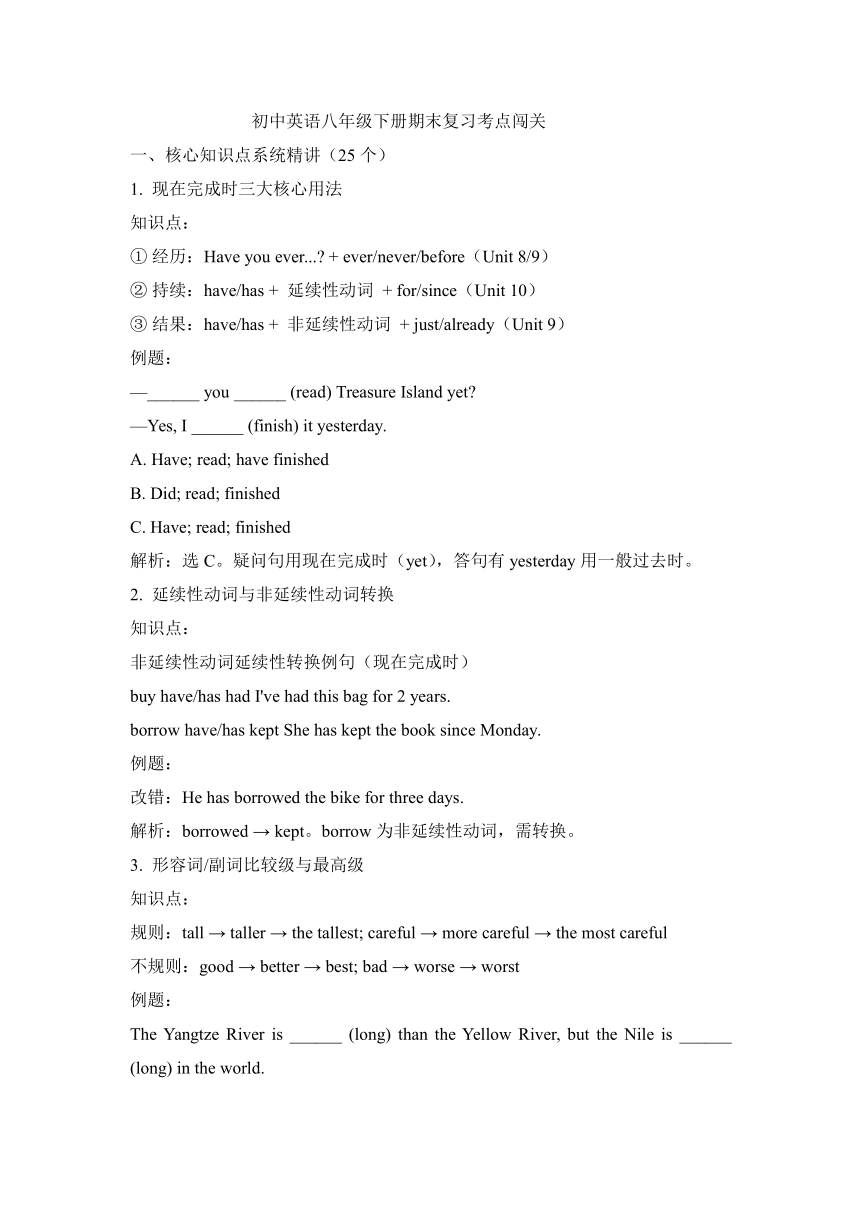
初中英语八年级下册期末复习考点闯关 一、核心知识点系统精讲(25个) 1. 现在完成时三大核心用法 知识点: ① 经历:Have you ever... + ever/never/before(Unit 8/9) ② 持续:have/has + 延续性动词 + for/since(Unit 10) ③ 结果:have/has + 非延续性动词 + just/already(Unit 9) 例题: —_____ you _____ (read) Treasure Island yet —Yes, I _____ (finish) it yesterday. A. Have; read; have finished B. Did; read; finished C. Have; read; finished 解析:选C。疑问句用现在完成时(yet),答句有yesterday用一般过去时。 2. 延续性动词与非延续性动词转换 知识点: 非延续性动词延续性转换例句(现在完成时) buy have/has had I've had this bag for 2 years. borrow have/has kept She has kept the book since Monday. 例题: 改错:He has borrowed the bike for three days. 解析:borrowed → kept。borrow为非延续性动词,需转换。 3. 形容词/副词比较级与最高级 知识点: 规则:tall → taller → the tallest; careful → more careful → the most careful 不规则:good → better → best; bad → worse → worst 例题: The Yangtze River is _____ (long) than the Yellow River, but the Nile is _____ (long) in the world. 答案:longer; the longest 4. 大数字与单位表达(Unit 7) 知识点: 千位分隔:5,430 → five thousand four hundred and thirty 单位复数:2,000 meters(非two thousands) 例题: 长城全长约_____千米。 A. twenty-one thousands and sixty B. twenty-one thousand and sixty C. twenty-one thousand sixty 解析:选B。千位与十位间加and。 5. 条件句(if引导的真实条件句) 知识点: 主句用一般将来时,从句用一般现在时: If it rains tomorrow, we will stay at home. 例题: If he _____ (come) early, we _____ (start) the meeting. 答案:comes; will start 6. 现在完成时与一般过去时对比(时间状语差异) 规则总结: 现在完成时一般过去时 强调动作与现在的关联 强调动作发生的具体时间 时间状语:already, yet, ever, never, just, for, since 时间状语:yesterday, last week, in 2020, ago 例句:I have read this book three times. 例句:I read this book last month. 例题: Q: She _____ (finish) her homework _____. A. has finished; just B. finished; just now C. has finished; yesterday 解析:选A。just(刚刚)与现在完成时连用;B中just now(刚才)需用一般过去时;C中yesterday不可与现在完成时连用。 7. How long 对持续时间的提问(Unit 10) 规则总结: 结构:How long + have/has + 主语 + 延续性动词过去分词 回答:For + 时间段 / Since + 时间点 注意:非延续性动词需转换(buy → have had, borrow → have kept)。 例题: Q: —_____ have you learned English —_____ I was six years old. A. How long; Since B. How often; For C. How soon; Since 解析:选A。How long询问持续时间,回答用since + 时间点。 8. 感官动词用法(look/sound/smell + adj.) 规则总结: 感官动词 + 形容词(描述状态):look happy, sound interesting, smell delicious 不可用副词修饰感官动词: The flower smells sweetly. → The flower smells sweet. 例题: Q: The music _____ (beautiful). I want to listen to it again. A. sounds beautifully B. sounds beautiful C. is sounded beautiful 解析:选B。sound为感官动词,后接形容词beautiful。 9. 被动语态(一般现在时结构) 规则总结: 结构:am/is/are + 过去分词 动作 ... ...
~~ 您好,已阅读到文档的结尾了 ~~

